To all of the other historical “firsts” in Pennsylvania, you can now add “America’s first cooking school” to the list! We recently learned about this fascinating slice of local food history from Beck Diamond, a Yardley-based journalist and food writer. She authored a book called Mrs. Goodfellow: The Story of America’s First Cooking School, which takes a look at the resourceful, pioneering woman, Elizabeth Goodfellow, who lived and worked in Philadelphia in the 19th century.
Diamond’s professional background is in journalism, she holds a graduate degree in library studies, and she spent much of her career in the corporate sector. However, after she read a short blurb about Goodfellow in a cooking magazine, the story captured her imagination. She pitched the idea to Westholme Publishing, also based in Yardley, which specializes in books about American history, and Diamond was soon on the hook to write a whole book about Goodfellow. The book was published in 2012 and recently re-printed in a paperback edition.
“I grew up in South Jersey and had never heard anything about this woman, and I just thought it sounded really fascinating,” Diamond says. “It was amazing that she was able to do all of this, not only the cooking school, but she had a pastry shop and a catering business … She was widowed three times in a similar amount of time and had to raise two children on her own, and she was really progressive for her time, and persistent.”
Diamond says that it was hard to find info about Goodfellow at first, as she didn’t keep any kind of journal (that exists) and never released a cookbook of her own. The Library Company of Philadelphia and the Historical Society of Pennsylvania became two indispensable resources, as were special collections at the University of Pennsylvania and Winterthur in Wilmington, Delaware. Some facts, like exactly where Goodfellow got her training from and if she was a practicing Quaker or not, were practically impossible to verify.
“I had to do quite a bit to pull together the sources,” Diamond says. “But that’s what I love to do, as a librarian, I love the research!”

Ms. Diamond (left) talking with a fan at an event in Philadelphia
Goodfellow kept a pastry shop and school on Dock Street in Philadelphia in the early 1800s, baking cakes and sweets for the city’s social elite, and teaching their daughters how to cook. Diamond points out that the school was not like cooking schools as we think of them today — this was more of a finishing school, where young women went to learn the skills that would make them more attractive as wives in the wealthy circles of Philadelphia.
The book is structured as a day-in-the-life of Elizabeth Goodfellow, as Diamond pulls from her historical research to imagine what her life might have looked like, as she baked in the hearth ovens in her basement-level kitchen and walked through the bustling market stalls on Market Street, overflowing with produce and meats from the surrounding counties.
Diamond keeps an active blog, where she experiments with many of the recipes she dug up in her research, many of which have incomplete directions or measurements that don’t comply with today’s standards. She notes how everything had to be made from scratch (there weren’t chemical leavening agents like baking powder or soda at the time) and in ovens without fine-tuned temperature controls. As vanilla was uncommon, spices like nutmeg or essences like rosewater were used to flavor desserts such as Lady Cake and marble cake.
To learn more about Elizabeth Goodfellow and America’s first cooking school, pick up Diamond’s book from Westholme Publishing, via Amazon or from your favorite independent bookseller.
- Photos: Emily Kovach




